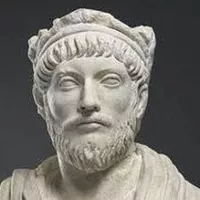Un messaggio dagli Dèi (357-361) - Ep. 6 (3)
Annunci
SEGNALA QUESTO ANNUNCIO
Ma cosa era successo davvero? Costanzo lasciò Antiochia in autunno inoltrato e si mise in marcia per Costantinopoli. Arrivato in Cilicia iniziò a sentire una febbre ma continuò la marcia con i suoi, nell'incrollabile desiderio di rimettere a suo posto Giuliano. Raggiunse Mopsuestia, una città della CIlicia in quella che oggi è la Turchia meridionale. Lì si dovette fermare, la febbre peggiorò e infine spirò. Non credo alla storia che indicò Giuliano comunque come erede: probabilmente gli alti papaveri del suo esercito capirono che nessuno di loro aveva speranze contro un sovrano con la legittimità a governare di un Giuliano e decisero di offrirgli il diadema. Costanzo aveva regnato come Augusto per 24 anni dalla morte del padre, con titanica determinazione aveva acquisito il dominio dell'oriente, poi dell'occidente sconfiggendo Magnenzio ed era stato Augusto dell'intero Impero Romano per 8 anni.
Costanzo è una figura controversa, in parte perché ha avuto cattiva stampa. Dovete capire che Costanzo era profondamente cristiano, come il padre, ma di fede ariana, o semi-ariana. Se un giorno avrò tempo dovrò fare un episodio dedicato agli antichi scismi della chiesa cristiana. I pagani alla Libanio, Ammiano Marcellino o i potenti latifondisti del senato di Roma non avevano molto in simpatia il loro secondo imperatore cristiano e esaltarono in contrasto il suo successore Giuliano. Allo stesso tempo gli scrittori cristiani sopravvissuti sono esclusivamente quelli della presto trionfante fede cattolica ortodossa e anche loro avevano da ridire su questo sovrano che favorì sempre gli Ariani, perseguitò Atanasio di Alessandria e forzò la mano più volte alla chiesa dell'impero per farle accettare il suo punto di vista religioso. Non aiuta Costanzo l'aver iniziato il suo regno con l'assassinio di quasi tutti i suoi parenti. Eppure spero di aver fatto capire negli ultimi episodi che Costanzo II non è una figura unidimensionale: Costanzo aveva un forte senso del dovere e dello stato, dimostrato in più occasioni quando il suo interesse personale fu in conflitto con quello dello stato romano. Costanzo fu anche un sovrano prudente: ereditò una guerra con l'Iran dal padre che probabilmente non voleva e cercò in tutti i modi di condurla nelle avversità al migliore dei modi, risparmiando i suoi soldati e le energie dell'impero. Fu efficace nell'amministrazione, anche se non sempre i suoi collaboratori furono all'altezza. Provò a trovare una formula di condivisione del potere, comprendendo che un solo augusto non bastava più a governare l'impero, ma finì per uccidere uno dei suoi Cesari e far guerra all'altro: l'impero era troppo vasto e le sue sfide militari troppo complesse per avere un solo imperatore Augusto ma lui non trovò mai la chiave per fidarsi davvero di un collega, né di impedire che questi si ribellasse.
Annunci
SEGNALA QUESTO ANNUNCIO
Prima di passare al regno di Giuliano, Vorrei lasciare un'altra di quelle molliche di pane che ci portano al passato e che sono presenti nelle nostre città. A Roma infatti c'è ancora un monumento di Costanzo II, che lo fece erigere nella sua unica visita nella città eterna. Si tratta dell'obelisco del Laterano: è il più antico e grande obelisco di Roma, realizzato ai tempi di Tutmosis III 3500 anni fa. Proviene dal tempio di Karnak, il più famoso dell'Egitto, ed era destinato al Circo Massimo. Fu eretto in Laterano solo durante il rinascimento. Il trasporto dell'immenso obelisco richiese la costruzione di una enorme nave apposita, condotta da 300 uomini, e il traghettamento a Roma da Ostia su una altrettanto enorme zattera. Il basamento originale portava una dedica di Costanzo che ci è stata trasmessa: ricorda la sconfitta del tiranno Magnenzio e il trionfo dell'imperatore. Eccone una sintesi:
“Questo dono a te Roma dedicò Costanzo Augusto, una volta sottomesso tutto il mondo. A te Roma eresse perché i suoi doni fossero pari ai suoi famosi trionfi.
Costanzo, convinto che tutto ceda al valore, comandò che venisse trasportato e ripose la sua fiducia nel mare rigonfio. Le acque, con placida onda, condussero la nave alle spiagge d'Occidente, con meraviglia del Tevere”.
Nel mentre che tu Roma eri devastata da un tetro tiranno, rimase a giacere il dono così come la preoccupazione dell'Augusto per la sua collocazione: non per orgoglioso disprezzo, ma perché nessuno credeva che un'opera di tanta mole potesse levarsi alle aure celesti. Ora questo obelisco tocca i cieli, come se la sua gloria a lungo conservata fosse di nuovo strappata alle cave rosseggianti”
Ma non affannatevi a trovarla oggi nel basamento dell'obelisco lateranense: questo fu ricostruito dai papi del rinascimento e la scritta originaria fu cambiata. Oggi la scritta dice semplicemente “Flavio Costantino Augusto – ovvero Costanzo – figlio di Costantino Augusto, prese questo obelisco, che suo padre rimosse dal luogo originario e per molto tempo lasciò ad Alessandria, lo mise su una nave gigantesca mossa da 300 uomini e attraverso il mare e il Tevere, lo trasportò a Roma con grossi sforzi per posizionarlo nel Circo Massimo e donarlo al Senato Romano e al Popolo“ Il nuovo basamento declama che in quel preciso luogo Costantino ricevette il battesimo da papa Silvestro, cosa che oramai voi sapete benissimo essere falsa, visto che Costantino non fu battezzato da nessun papa ma dal vescovo ariano Eusebio. Ma come detto, i papi ci tenevano molto a tramandare questa storia, in quanto simbolica nel definire la relazione tra imperatori e papi.
Annunci
SEGNALA QUESTO ANNUNCIO
Con questo possiamo dare il nostro addio a Costanzo, buon riposo. Te lo sei meritato dopo 24 anni di regno. Nel prossimo episodio parleremo del regno del tuo successore. Vedremo come Giuliano non seguirà il tuo esempio e passerà all'attacco, sia della tua fede cristiana che del tuo arcinemico persiano. Ma stai tranquillo, sarà un breve regno e niente di quello che inizierà Giuliano avrà buon fine.
Grazie mille per aver letto questo episodio! Se vi interessa iscrivetevi alla qui presente pagina o seguitemi su facebook, twitter e Instagram. Alla prossima puntata!

